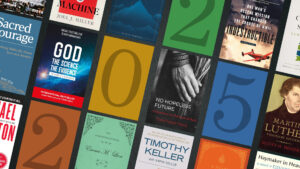The last in a five-part series titled “Fearfully and Wonderfully Made,” this article originally appeared at The Rabbit Room.
“The fruit of the Spirit is love, joy, peace, patience, kindness, goodness, faithfulness, gentleness, self-control; against such things there is no law.” —Galatians 5:22-23
We sat together, just the two of us. The sun would be coming up any minute. We didn’t say much. We couldn’t. We were on the verge of bursting into tears, but neither did. What we did say was mostly of a lighthearted nature.
It was our 18th anniversary.“In sickness and health,” I joked.
“Yeah, well,” she said, “it’s only fair. You stuck with me through four labors and deliveries. It’s the least I can do.”
A man wearing black scrubs and carrying a clipboard entered the waiting area and barked, “Ramsey. Ramsey.”
Together we stood and made our way to the shouting man who led us to the elevator.
“I’ll be right out here,” my wife said. “I’ll see you just as soon as they’re done.”
I squeezed her hand, gave her a kiss, handed her my wedding ring, and then stepped into the elevator as it closed and carried me up and away.
The man in black said, “If you have any modesty issues, now is the time to get over them.”
He spoke as though I’d done something wrong and was about get my comeuppance. I don’t know why he did this.
He continued, “I’m taking you to the pre-op ward. The first thing they’re going to have you do is strip down to nothing.”
What he lacked in bedside manner he made up for in accuracy. A nurse met us at the door and led me to a room filled with beds separated only by curtains. He gave me a hand towel and told me to strip down so he could shave me.
“Um, what?” I asked.
“I need to shave you from your neck to your toes. Standard procedure for open heart surgery,” he said. “I’ll be right here on the other side of the curtain. Go ahead and lie down on the bed when you’re done. You can cover yourself with that towel. Holler at me when you’re ready.”
With no option but to comply, I played my only card: “You’re going to bring me a sedative soon, right?”
He said, “Just as soon as I’m finished your surgical team will pay you a visit and set you up with an IV. They’ll give you something then to help you relax.”
I did as instructed, and after he at last clicked off the electric shaver, my nurse draped a white cotton blanket over me, and then a second one, tucking them in tightly under my legs and sides, as if to say, “Sorry, friend. Here’s a little of that modesty back.”
I hadn’t been that vulnerable since the day I was born.
As I waited I thought about my wife down in the lobby. Never in 18 years of marriage would we have imagined I’d be lying in this bed, not at my age anyway. I thought about how strong she’d been in the weeks leading up to this day, and how she’d carried so much with such grace. Though we’d kept the mood light in the waiting room, I knew, in a way only a husband of two decades could, a bit of the sorrow she now sat with. And I loved her for it.
The Puritans used to say you got married in order to fall in love. They reasoned: How can a man and woman possibly hope to know the wonder, joy, and depth of real love—the kind where you are truly known and truly loved at the same time—without making those two lives into one thing?
The qualities I love most about my wife were largely unknown to me when we married. We’d known each other for a few years, but we both brought oceans of deep, unexplored waters to that altar. We promised to stay together in plenty and in want, in sickness and in health, for better or for worse, but neither of us knew what those words would cost or where they would take us. How could we? We were kids. Yet there we stood, she in her shimmering ivory and me in my rented tux—the angel and the penguin—promising, like a couple of immortals, to sound those depths together until one of us died.
But I couldn’t have known how she would pour her love into our kids; how she would build them up and guard their hearts. When we moved them away from their friends in one city to a place they didn’t know, I watched this woman join them in a sorrow they were too young to name. I watched her grieve their heartache and risk new relationships to help them begin again.
I couldn’t have known how she would lay down her life to support God’s call on mine, or how she would count that as God’s will for her as well without complaint, resentment, or doubt.
I couldn’t know how she would fight for me to return to her when I’d withdraw into myself out of fear, or how she would comfort me with gracious words when I felt lost and alone, or how she would confront me with a loving rebuke when I needed someone to break anxiety’s spell.
I couldn’t have known the home she would make for us—practical, happy, and beautiful. Or how she would remember her friends’ joys and sorrows throughout the years—always ready to celebrate with real joy or to mourn with genuine tearful sadness.
Now here we were, 18 years later. With four cities, four kids, and probably four dozen W-2’s between us, I marveled at the woman in the lobby making good yet again on her promise to stay. The penguin had no idea.
Soon my surgical team began their rounds. No fewer than a dozen people passed through my curtain, each armed with a medical device or a clipboard full of forms. After they’d asked every question they needed to hear me answer—Did I know where I was? Did I know why I was there? Did I know my name and birthday?—they injected a warm liquid into my IV that left me awake but set me free from all of life’s carking cares.
And so I went off to surgery in much the same way I came into this world—completely vulnerable and swaddled in warm hospital cotton, watching the tiles overhead pass as they delivered me from my familiar warmth into the cold air and bright lights of the operating room.
The last thought to pass through my mind before they took me completely under was that I would either wake up in recovery or in glory.
I first opened my eyes to a blurry figure in white standing at the foot of my bed, shining so bright I had to squint. Was this the angel dressed in lightning who sat atop Jesus’ empty tomb that first Easter morning, coming to tell me I’d risen to newness of life (Matt. 28:1-10)? Or had Abraham’s visitor by the Oaks of Mamre appeared to tell me to hang on just a little longer (Gen. 18:1-15)? As I adjusted to the light I realized the vision in white was my wife in the sweater she put on that morning. She was the most beautiful thing I had ever seen—my friend, my heart, my love. Her glory flooded into the fog of my waking and I came to.
My nurses were determined to get me up on my feet as soon as possible, but due to the stroke I suffered during surgery, I had lost the use of my left foot. I couldn’t stand. This detail was irrelevant to my caretakers. They hoisted me and my lifeless leg to the standing position and forced me to walk by pushing and pulling one leg in front of the other. Eight feet from the bed to the window and eight feet back.
Every step was an exercise in defeat. I couldn’t do it. I sulked. When I was young I used to walk wherever I wanted. But now I stretched out my hands and others carried me where I did not want to go (John 21:18). I tried to object, but the stroke had also shut down a significant part of my ability to speak, so I couldn’t express my frustration. As they carried me across the room and back, my wife stayed where I could see her, encouraging me. She said she was proud of me. She told me she believed I could do this and that she loved me.
I lifted my eyes to the vision in white—the wife of my youth—and focused all my confusion, pleading, anger, and frustration into a single venomous glare that said to her, “You leave me the hell alone.”
Anesthesia is a strange monster. Anyone who has been through something even as simple as having their wisdom teeth removed has likely provided at least a few minutes of entertainment for their loved ones. It’s one of those rare times when a man gets a free pass for whatever comes out of his mouth. But it’s also true that traumatic situations don’t create a person’s character so much as they expose what’s already there. Silence a man’s inner dialog and take away the filter through which he runs what he chooses to say and what he keeps inside, and what comes out of him will likely fall closer to the truth than to fiction. If this is true, then it is in me to belittle kindness and glare at beauty. It is in me to tell the ones who love me most to go away. It is in me to reject the advances of grace. And it is true. I know it is.
I remember the first time I saw my wife. We were freshmen in college, less than a month in. I was sitting in the lounge outside the library when she passed through. My initial reaction was one of disbelief. She was the most beautiful girl I’d seen in my short but attentive life. I had to do a double take just to confirm my eyes weren’t playing a trick on me. Could someone really be that pretty? I resolved to find ways to put myself in her path in the hope that our roads might eventually converge into one.
Over the next four years we danced a dance that led us to this hospital room. She remained so radiant that when I woke from surgery I mistook her for an angel, or at the very least someone draped in the splendor Moses brought down from the mountain to a fearful people (Exod. 34:29-30). But as it went with Moses and the children of Israel, my eyes grew accustomed to her glory and I quickly moved from wonder to a familiarity that bred in me a heavily medicated yet nevertheless contemptible scowl. She took it without a word, dissolving my wrath with the soft answer of a smile (Prov. 15:1). She pulled her chair up next to my bed and lay her head down by my side.
After I’d been home for a couple weeks, I asked her if she ever noticed that I gave her a few dirty looks. I remembered doing this, but never knew if she’d noticed. She told me I glared at her many times those first few days.
“Did it ever get to you?” I asked.
She told me she knew they came out of frustration. I was hurting and medicated, exposed and weak. I couldn’t take myself to the bathroom or pour a drink of water. Often I couldn’t even find the words to ask for help. Like a baby on his back, I made my needs known through tears and protest.
“Still, I’m sorry,” I said. “What did you do when I scowled at you?”
“I cried,” she said. “But never so you could see. I’d step out into the hall or into the bathroom, cry my tears, and pull myself together before coming back.”
“I made you leave?” I said.
“No,” she said. “Most of the time I would wait for you to fall asleep and then I’d scoot my chair up next to the bed so that I could lay my head by your side and cry there.”
I had no idea. All I remembered was that she was the picture of grace—steady and ever-present, deflecting my misdirected frustration with a gentleness that won my heart. Hers was the voice of wisdom; all she spoke were words of kindness (Prov. 31:26). She lavished me with goodness and mercy. She filled the room with love, joy, and peace. She put my ring back on my finger, just as she’d done 18 years before, to say to me, “I still choose you.” Against such things there is no law (Gal. 5:23).
There in my brokenness I had so little to give. But grace, she never left. She met me in all my frailty, raw and wrathful, as exposed and defenseless as the day I was born. There she stayed, tending to me with kindness and mercy, weeping both for her sorrow and mine while I slept, in a chair scooted up next to my bed so that she could lay her head by my side because she loved me.
Download your free Christmas playlist by TGC editor Brett McCracken!
 It’s that time of year, when the world falls in love—with Christmas music! If you’re ready to immerse yourself in the sounds of the season, we’ve got a brand-new playlist for you. The Gospel Coalition’s free 2025 Christmas playlist is full of joyful, festive, and nostalgic songs to help you celebrate the sweetness of this sacred season.
It’s that time of year, when the world falls in love—with Christmas music! If you’re ready to immerse yourself in the sounds of the season, we’ve got a brand-new playlist for you. The Gospel Coalition’s free 2025 Christmas playlist is full of joyful, festive, and nostalgic songs to help you celebrate the sweetness of this sacred season.
The 75 songs on this playlist are all recordings from at least 20 years ago—most of them from further back in the 1950s and 1960s. Each song has been thoughtfully selected by TGC Arts & Culture Editor Brett McCracken to cultivate a fun but meaningful mix of vintage Christmas vibes.
To start listening to this free resource, simply click below to receive your link to the private playlist on Spotify or Apple Music.


































